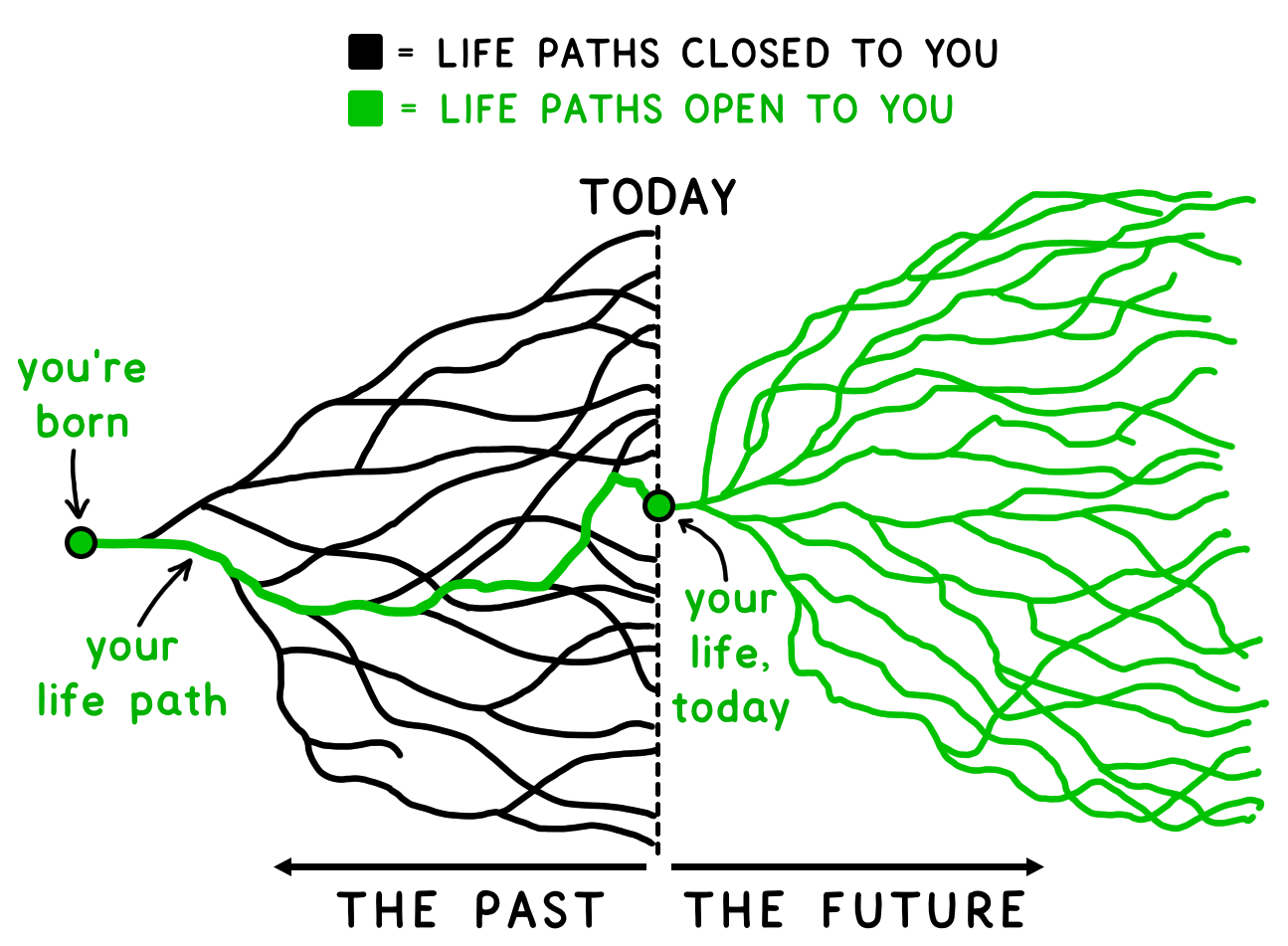💡Meditations
The State Capacity Theory Of Everything: there is a growing consensus that the West is in decline. Income inequality, woke culture, housing shortage, climate change, low productivity growth, obesity, falling fertility rates are ingredients of a mix that people use either to justify their degrowth and nihilistic agenda or get motivated to fix things (this blog is, of course, a big advocate of the latter).
One of the most influential articles I have read the past years is the Housing Theory of Everything from the always excellent Works In Progress. I highly recommend you reading it in detail but in a nutshell the authors believe that housing shortages are the root cause for all the malaise in the West. You may agree or disagree with this view (I personally don’t) but the reason I really loved this post is because it follows a clear and action-oriented rationale on how to fix things. If you are a subscriber, you already know that a core tenet of my life philosophy is an action-first mindset. Only when you do things, you can move forward. You may go sideways or even backwards before you go forward but only when you act, you will generate information to update your worldview. If you want a more academic term, you can use the word “effectuation” which is one of the core values of great tech entrepreneurs I personally admire like Jude Gomila and Brian Armstrong. Or if you are a visual person, this viral meme is a good depiction of effectuation and path dependent futures.
My personal unified theory of everything is that the overall decline is a result of the institutional decay and low state capacity in the West. These two aren’t the same but are communicating vessels. The Niskasen Center has observed that declining state capacity has led to declining trust in government – and a growing impatience with the often messy and muddled workings of democracy
The institutions that were once the four pillars of Western society - representative government, the free market, the rule of law and civil society - are degenerating. The U.S. state capacity is rapidly declining. For example, roads and trains in the U.S. cost much more per mile than other rich countries. Ezra Klein has written a lot about our inability to just build.
So how do we fix this? Renovating democratic institutions and increasing state capacity aren’t easy tasks and definitely don’t have a single magical solution. But at the same time, we have to start somewhere and I am very confident we now have important tools in our hands to help us accelerate.
These “tools” is a combination of sociocultural trends and technological advancements that together form a perfect recipe for meaningful change. I will focus more on the technology side of things but a short summary of the cultural change I see is the continuous rise of Progress studies, optimistic mindset, YIMBYism, nuclear energy advocacy and the realization that “technocracy” is a losing bet.
When it comes to technology, what makes me bullish is the rapid advancement in emerging tech (AI, bio, crypto, energy, defense) and cross-pollination of ideas between seemingly separate fields. I see crypto as a horizontal technology that can enhance other fields infusing them with a foundation of trust, verifiability, transparency and -sometimes- decentralization. I have argued for long time that Crypto needs to become more extrovert and insert itself in the tech optimism and accelerationism narrative.
So what does this have to do with Institutions and nation building? Here are some examples and ideas of how crypto can make Democracy future proof.
Next-gen Capitalism: a combination of smarter property rights, global and 24/7 free markets and trustless systems is the perfect recipe for an evolved version of capitalism. Packy’s post is still an excellent read on why onchain capitalism is just better than current capitalism. It’s true that capitalism has got a bad name the past years mostly because it’s associated as the root cause of inequality but it’s still the best system we have, it has proven it can bring tangible results to world’s GPD and it’s directly connected with the future of liberalism. Liberalism is another “theory” whose meaning has completely altered from its initial inception but in its core is a philosophy that focuses on individualism, liberty, free markets and equality. These are values that act as communicating vessels with capitalism and can be championed by crypto. Hayek FTW!
Government information integrity: at its heart, the institutional crisis is about trust. As the political scientist Francis Fukuyama has argued, “Belief in the corruptibility of all institutions leads to the dead end of universal distrust. American democracy, all democracy, will not survive a lack of belief in the possibility of impartial institutions; instead partisan political combat will come to pervade every aspect of life.” Blockchain and zero knowledge technologies can solve this by bringing transparency and verifiability to almost all government information from voting to political campaigns and from fiscal figures to agencies spending. One way to have better bureaucracy is to have transparent bureaucracy. Side example: I am Greek and
Participatory Governance + Deliberative Polling: we need to do a better job on engaging and informing every citizen about local and national issues. It is not possible to manage toward outcomes that are good for all without the inclusion of all in the structures of decision-making used for that management toward outcomes. But at the same time, we can’t succumb to a vetocracy. We already have some early examples of Citizen Assemblies and real-time AI systems for gathering, analyzing and understanding what large groups of people think. We need to accelerate this and incentivize everyone to participate through zk-voting, NFTs for contributions to local groups and quadratic voting.
Prediction Markets-Based Policymaking: public discourse around improving democratic systems is currently stagnant and market failures are creating problems across domains, from climate change to extreme inequality in access to healthcare. With prediction markets gaining increasing popularity, we could test a model where an LLM trained with country-specific data is measuring predictions against actual outcomes and asks citizens to vote on policies enabling subsidiarity and reducing conflict between groups.
Decentralizing Energy: DePINs redefine physical infrastructure management by embedding smart contracts into operational systems. This shift not only reduces operational costs but also accelerates service delivery. Energy DePINs enable individual energy producers, such as homeowners with solar panels, to engage directly in peer-to-peer energy trading. This model bypasses traditional utility frameworks, fostering the adoption of renewable energy sources and democratizing access to energy markets. For example, a16z recently published how we could have a much more performance electric grid if we decentralized it ahead of an incoming load growth.
"Part of the purpose of innovation is to avoid the Solzhenitsyn experience in The Life of Denisovich... where every day is predictable. That is the definition of inhumanity. As humans, we need change."
Alain Bertaud (source)
📌 Mind Crunches
An excellent interview with Matt Lira on why U.S. Congress is so slow to adopt digital technologies.
“That would liberate the rest of that time for higher order tasks, whether that's proactively communicating with constituents or doing legislative research and oversight. And that's just one office. If you take that and apply it across all 435 offices, you've unlocked a ton of institutional capacity.”
I have written in the past about the Cobra effect of policymaking/regulation and how sometimes well intended movements generate undesirable results. Maxwell Tabarrok has a really interesting post on how environmentalism, one of the most influential political movements of the past decades, is both unnatural and polluting. Eye-opening!
Extremely excited about the Biden-Harris Housing Plan and their clear focus to accelerate/improve it. Make YIMBYism Great Again.
Andy Matuschak on his most extensive and insightful post on the science of learning aka how to learn to learn. I picked up the concept of “spaced repetitions” from Andy’s blog a few years ago and it proved to be very impactful for me. This post includes many more tips and recommendations.
On a similar note, an oldie but goldie post from Haseeb on why our psychological self-reaction to try NOT to look stupid prevents us from actually learning hard things. Excellent!
I was one of the very few people who publicly said that the Microsoft<>Open AI deal had some amazing short-term impact but it would soon become bumpy and gnarly. Competing incentives, overlapping Venn diagrams between different Open AI partnerships with Big Tech, corporate governance drama, OS AI catching up are very strong forces to ignore. It now seems it’s public consensus that the deal isn’t as perfect as once seemed.
It’s very common for the Silicon Valley crowd on Twitter to create cool new narratives about “world changing” startups and I will admit that I have been a victim of this in the past. A great example is Lambda School which apparently was a huge scam inflated by fake numbers and a super-confident CEO who was willing to publicly lie about these numbers. A great read that feels like Bad Blood.
Concerning field results for UBI-like experiments keep coming up. If you are interested in UBI, I highly recommend Esther Duflo’s “Poor Economics”.
Synthetic data won’t solve the data wall problem on their own. New research shows that indiscriminate use of model-generated content in training causes irreversible defects in the resulting models, in which tails of the original content distribution disappear. Also, my pov about the data wall problem.
A blogpost on how life in China actually is from the always excellent Lux Securities. Self-recommended.
Palmer Luckey’s interview at Tablet magazine is already viral (and a great read). The most interesting part of it is Luckey’s view about free will and how our environment at early age pretty much shapes (or determines if you want) what we will do in the future. Luckey thinks that future is pretty deterministic to which I personally agree. A great assorted post was recently published by the excellent Matt Clancy about the effect that mentors have on what their students will study.
“I’ve always done a lot of thinking around free will and whether it exists,” he said as his eyes reopened. “And I’m quite concerned that I’m doing what I was programmed to do when I was 8 years old. If you like Yu-Gi-Oh! and the Power Rangers, can you really do anything except build virtual reality and tools of violence to enact your aims while feeling superior?”
“Probably not,” he said. “You probably just have to do it.”
My latest obsession is Virginia Postrel.
Super cool AI hardware that I don’t need but I would buy just to reward the unconventional mindset of Avi Schiffmann.
Personal highlight of summer: meeting Manolis Kellis in person. He is building some really cool stuff that will go public pretty soon. His podcast with Lex is a great way to get familiar with his research.
I have written multiple times in the past how impressed I am by Sakana AI and their focus on nature-inspired methods to advance cutting-edge foundation models. Their latest “AI Scientist” release is probably the most fascinating thing I have personally seen since the whole ChatGPT craziness started. It is the first comprehensive system for fully automatic scientific discovery from idea generation to paper writing. Even as I am typing this, I can’t fully scope the importance of this initiative. Super bullish on Sakana AI!
Patrick Collison on how to change the world.
It was a matter of time to see the AI stack getting commoditized and turn into a race to the bottom.
Recommended Blog: The Techno-Humanist Manifesto by Jason Crawford
Recommended Book: The Wager: A Tale of Shipwreck, Mutiny and Murder - David Grann
Recommended Podcast: Evolved Technology - Why Tech Is Counter-Intuitively Pushing Us Back To Natural Products In Pharma
Quote: “The whole is simpler than its parts” Josiah Gibbs
Photo: Charging batteries in Chalki, Greece





